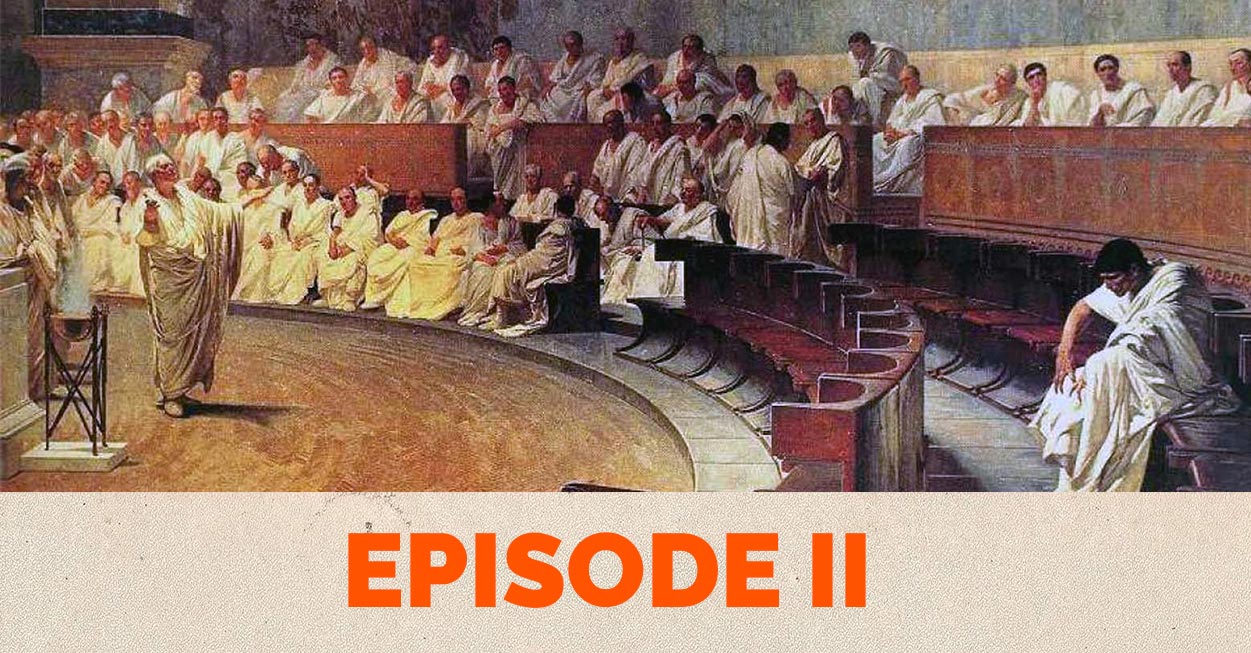Rome was the most powerful empire in antiquity. But were the Romans free to speak truth to power? Did history’s first successful Women’s March take place in Rome? And who came out on top when the words of Cicero clashed with the ambition of Caesar and armies of Octavian? Why did historians and astrologers become endangered species when the Republic became an empire? Find out in episode 2 of “Clear and Present Danger: A History of Free Speech”.
You can subscribe and listen to Clear and Present Danger on iTunes, Google Play, YouTube, TuneIn and Stitcher, or download episodes directly from SoundCloud.
Stay up to date with Clear and Present Danger on the show’s Facebook and Twitter pages, or email us feedback at freespeechhistory@gmail.com.
Literature: Episode 2
General Roman history
- Beard, M. (2015): Chapter 4: SPQR – A History of Ancient Rome. London, UK: Profile Books.
- Davies, N. (1997): ”III. Roma: Ancient Rome, 753 BC-AD 337” in: Europe: A history. London, UK: Pimlico.
- Livy: History of Rome. Accessible at: http://oll.libertyfund.org/titles/livy-the-history-of-rome-by-titus-livius-in-6-vols.
- Momigliano, A. (1974): ”Freedom of Speech in Antiquity” in: Wiener, P.P. (ed.): Dictionary of the History of Ideas. Accessible at: http://xtf.lib.virginia.edu/xtf/view?docId=DicHist/uvaGenText/tei/DicHist2.xml;chunk.id=dv2-31;toc.depth=1;toc.id=dv2-31;brand=default.
- Robertson, J.M. (1915): A Short History of Freethought, Ancient and Modern. Ed. London, UK: Watts & Co. Chapter 6.
- Rowe, C., Schofield, M., Harrison, S. & Lane, M. (eds.) (2008): The Cambridge History of Greek and Roman Thought. Cambridge, UK: Cambridge University Press.
Roman society, Roman law and the political system
- The Laws of the Twelve Tables. Accessible at: https://www.csun.edu/~hcfll004/12tables.html.
- Beard, M. (2015): Chapter 4: ”Rome’s Great Leap Forward” in: SPQR – A History of Ancient Rome. London, UK: Profile Books.
- Davies, N. (1997): ”III. Roma: Ancient Rome, 753 BC-AD 337” in: Europe: A history. London, UK: Pimlico.
- Larsen, J.A.O. (1955): Representative Government in Greek and Roman History. Oakland, CA: Berkeley University of California Press.
- Livy: History of Rome. III, book 25. Accessible at http://oll.libertyfund.org/titles/livy-the-history-of-rome-by-titus-livius-in-6-vols.
- Mouritsen, H. (2017): Chapter 1: ”Senatus Populusque Romanus” in: Politics in the Roman Republic. Cambridge, UK: Cambridge University Press. 6-53.
- O’Donnel, J. (2016): Pagans: The End of Traditional Religion and the Rise of Christianity. New York, US: HarperCollins
- Polybius: Rome at the End of the Punic Wars. Book 6. Accessible at: https://sourcebooks.fordham.edu/halsall/ANCIENT/polybius6.asp.
Libertas and Licentia
- Braund, S.M. (2004): ”Libertas or Licentia? Freedom and Criticism in Roman Satire” in: Sluiter, I. and Rosen, R. (eds.): Free Speech in Classical Antiquity. Boston, MA:
- Chrissanthos, S. (2004): ”Freedom of Speech and the Roman Republican Army” in: Sluiter, I. and Rosen, R. (eds.): Free Speech in Classical Antiquity. Boston, MA:
- Mallam, C. (ed.) (2016): Parrhesia in Dio’s Roman History.
- Wirszubski, C.H. (2009): Libertas as a Political Idea at Rome during the Late Republic and Early Principate. Cambridge, UK: Cambridge University Press.
- Arena, V. (2012): Libertas and the Practice of Politics in the Late Roman Republic, Cambridge, UK: Cambridge University Press.
The Late Republic and the Decline of the Republic: The Gracchi, Cicero, Cato and Caesar
- Beard, M. (2015): SPQR – A History of Ancient Rome. Profile Books. Chapters 1, 6 and 7. London, UK: Profile Books.
- Brunt, P.A. (1988): The Fall of the Roman Republic and Related Essays. Clarendon Press. Chapters 1 and 6.
- Cassius Dio: Roman History. Book 43:10, 45:18 and 45:26. Accessible at: http://penelope.uchicago.edu/Thayer/e/roman/texts/cassius_dio/home.html.
- Cicero, M.: Brutus, A History of Famous Orators. Accessible at: http://www.attalus.org/old/brutus1.html.
- Cicero, M.: Pro Flacco. Accessible at: http://perseus.uchicago.edu/perseus-cgi/citequery3.pl?dbname=LatinAugust2012&query=Cic.%20Flac.&getid=1.
- Everitt, A. (2006): Augustus: The Life of Rome’s First Emperor. New York, NY: Random House.
- Everitt, A. (2001): Cicero: A Turbulent Life.
- Holland, T. (2003): Rubicon: The Triumph and Tragedy of the Roman Republic. New York, NY: Doubleday.
- Plutarch: Life of Cicero. Accessible at: http://classics.mit.edu/Plutarch/cicero.html.
- Plutarch: Life of Gaius Gracchus. Accessible at: http://classics.mit.edu/Plutarch/gracchus.html.
- Plutarch: Life of Tiberius Gracchus. Accessible at: http://classics.mit.edu/Plutarch/tiberius.html.
The Principate and the early Roman Empire: From Augustus to Caligula
- Beard, M. (2015): SPQR – A History of Ancient Rome. London, UK: Profile Books. Chapters 7-12.
- Cramer, F.H. (1945): ”Bookburning and Censorship in Ancient Rome: A Chapter from the History of Freedom of Speech” in: Journal of the History of Ideas 6(2), pp. 157-196.
- Konstantinos SP Staikos (2007): The History of the Library in Western Civilization Vol II.
New Castle, DE: Oak Knoll Press.
- McHugh, M.R. (2004): ”Historiography and Freedom of Speech: The Case of Cremutius Cordus” in: Sluiter, Ineke and Rosen, Ralph (ed.): Free Speech in Classical Antiquity. Boston, MA: Brill.
- Sarefield, D.C. (2004): ”Burning knowledge”: Studies of Bookburning in Ancient Rome. Accessible at: https://etd.ohiolink.edu/!etd.send_file?accession=osu1092663236.
- Seneca Rhetor: Controversiae, X, pr. 5-7. In: Cramer, F.H. (1945): ”Bookburning and Censorship in Ancient Rome: A Chapter from the History of Freedom of Speech” in: Journal of the History of Ideas 6(2).
- Suetonius: The Lives of the Caesars – The Deified Augustus. Accessible at: https://sourcebooks.fordham.edu/ancient/suet-augustus-rolfe.asp.
- Suetonius: The Lives of the Caesars – Tiberius. Accessible at: https://sourcebooks.fordham.edu/ancient/suet-tiberius-rolfe.asp.
- Tacitus: Annals, II, 32. Accessible at: http://classics.mit.edu/Tacitus/annals.html.
Veiled speech: Fables and the Golden age of Latin Literature
- Beard, M. (2015): SPQR – A History of Ancient Rome. London, UK: Profile Books. Pp. 414.
- Pagán, V. (2004): ”Speaking before superios: Orpheus in Vergil and Ovid” in: Sluiter, I. and Rosen, R. (eds.): Free Speech in Classical Antiquity. Boston, MA:
Great podcasts on Roman history
- Dan Carlin.: Hardcore History ep. 34-39: Death Throes of the Republic. Accessible at: http://www.dancarlin.com/product/hardcore-history-death-throes-of-the-republic-series/.
- Mike Duncan: The History of Rome. http://thehistoryofrome.typepad.com/.

